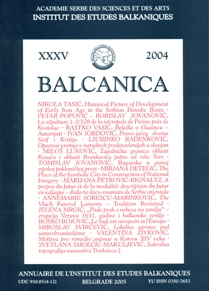Pravo jačeg – Drama Sisif i Kritija
The Right of the Stronger, The Play Sisyphus and Critias
Author(s): Ivan JordovićSubject(s): History
Published by: Balkanološki institut - Srpska akademija nauka i umetnosti
Keywords: the play; Sisyphus and Critias; the right of the stronger;
Summary/Abstract: The focus of this study is the standpoint of the play Sisyphus and Critias, the leader of the Thirty towards the right of the stronger. This is a question of constant interest in scienti.c circles, since its answer can serve as the indicator of the in.uence this famous theory has had. This interest has been encouraged by the fact that Critias’ autorship of the play is questionable. However, the question of the author is not of primary importance for this article, because there are some arguments, among some well known ones, which were not considered and which show that in this satire, regardless of the author and the purpose of this fragment, the right of the stronger is actually non-existant. The .rst argument to support this theory is that nomos-physis antithesis is nowhere explicitly mentioned although it is the crucial element of the right of the stronger. In addition there is no claim in the play that the exploitation of the strong by the week or by law accured. The second argument is that despite the incapability of laws to prevent the secret injustice, they and their importance for the human society are depicted in a positive light. It should also be noted that, unlike Callicles and Glaucon, laws are created to stop the bad and not the good. The third argument is that the invention of religion is accepted as a positive achievement, which .nally enables the overcoming of primeval times and lawlessness. The re.ection of this argument is a positive characterisation of the individual who invented the fear of gods. The fourth argument, which has not been taken into consideration so far is the way the supporters and opponents of lawlessness are described and marked as κακοί and ¬s\lo¿. In the satire only physically strong are considered as strong, as opposed to Callicles, where they are also spiritually superior. Intelectually superior in Sisyphus is the inventor of the fear of gods who is also in favor of law and order. The fact that the strong are described as kako¿ while the supporter of law are recognized as ¬s\lo¿ is also of great importance. In other words, this division re.ects strong in.uence of aristocratic set of values by which the ¬s\lo¿ are in every way superior to the κακοί.
Journal: BALCANICA
- Issue Year: 2004
- Issue No: 35
- Page Range: 51-71
- Page Count: 20
- Language: Serbian

